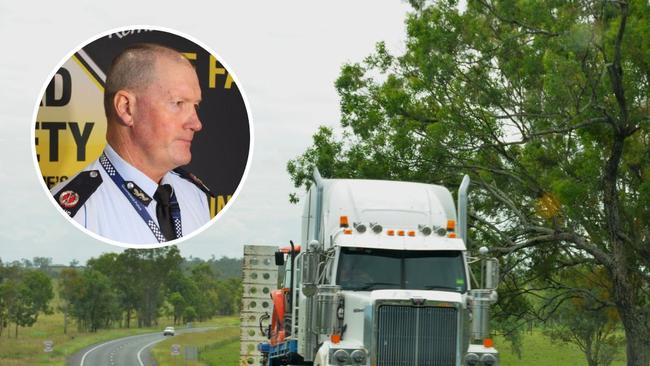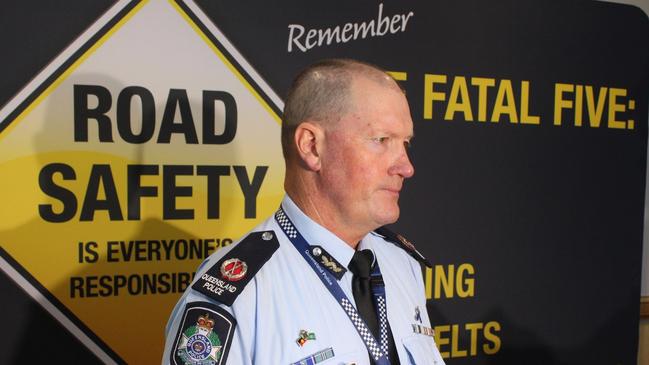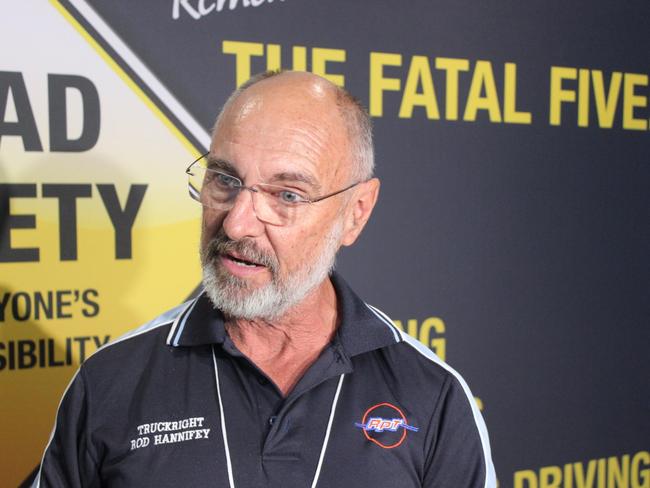Qld Police, trucking industry weigh up first responder training for drivers at crashes
A major trucking industry forum has shone a light on some of the harrowing realities of the job. Here’s what authorities plan to do to help.

Community News
Don't miss out on the headlines from Community News. Followed categories will be added to My News.
Boosting first aid training for drivers to help them become better first responders at a crash scene has been flagged for the trucking industry.
The option was raised by Assistant Commissioner Kev Guteridge at a recent Regional Queensland Heavy Vehicle Safety Forum in Mackay.
He said that “unfortunately, all too often”, truck drivers may find themselves first on the scene of a road accident rendering first aid to a victim, without the necessary skill set.
“How do we work with industry to boost that first aid training,” he asked.

Assistant Commissioner Guteridge said it was the ability of first responders, usually civilians like truck drivers, to provide “lifesaving” first aid that was directly attributed to victims surviving.
He said there was an awareness that truck drivers called on as first responders to a crash scene were likely to be changed by that experience and would require support.
Assistant Commissioner Guteridge said the changing demographics of the trucking industry, such as newer drivers unfamiliar with driving this country, was another challenge to be addressed.
They required education on driving to Australian conditions, such as the tyranny of distance and road conditions, he said, which could be addressed through regulation and accredited training.
He also said the presence of drivers using drugs was another problem that went beyond the trucking industry into the wider driving community, as well as the possibility of self-harming drivers.
“We’ve realised that with an increase in drug use over a very long period of time, there are increased challenges in mental health and the increased economic hard times we are currently going through at the moment, the pressure’s on the people, to maybe self-harm,” he said.
“Unfortunately, we can’t rule that out.”
He said road safety was not a matter for law enforcement, but driver behaviour, which meant the responsibility fell on the driving public’s shoulders.
“Clearly, expecting the coppers to do the enforcement that’s going to make a change is not it. It has to go back to the drivers taking responsibility for themselves,” he said.
On driver behaviour, he said the trucking industry’s regulation regarding fatigue was “quite phenomenal” with its control over drivers.
“What we don’t have is the same level of control over a person driving a car,” he said in regards to fatigue.

Dubbo-based truck and road safety advocate Rod Hannifey echoed the call for more responsible driving by all on the road and for truck drivers to have a greater say in forums like the Mackay one.
“If we can educate people about sharing the roads with trucks more; not only are they safer but so are we,” he said.
He also said more practical concerns had to be addressed such as better designed rest stops that may not be wide enough or increase the possibility that large vehicles may have to turn on the open road or highway.
“I really value being here to have a say but it has to be done a lot more,” Mr Hannifey said.
On suicide on the road, Mr Hannifey said it was a grim reality.
“I’ve known some people who’ve been involved with it. And some of them never go back on the road again because it’s about ‘what if …’ ‘What if I had slowed there’, ‘what if I had done something else, it wouldn’t happen?’ You can’t control it,” he said.
“A train driver can say there’s nothing I can do. I know people who have been involved in suicide by truck. And at the time that’s a terrible event, you don’t know what it is.
“Some can survive it. Some just walk away from the industry.
“People who do that don’t take into account what happens to you.
“If you’re involved in an accident as a driver and you know there’s nothing you could have done, it’s one thing to say that, but that’s going to be in your nightmares for the rest of your life and people don’t recognise that we are affected that way by those things.”




